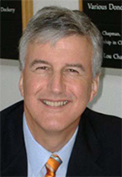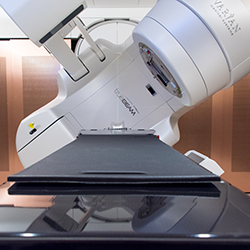Renowned Oncology Surgeon Joins UA
William Cance, MD, has joined the University of Arizona Cancer Center as deputy director and will lead the efforts in Phoenix at the UA Cancer Center at Dignity Health St. Joseph’s Hospital and Medical Center.

“I believe that the partnership between a National Cancer Institute-designated Comprehensive Cancer Center such as the UA Cancer Center and a world-class health-care organization such as Dignity Health St. Joseph’s will serve to integrate delivery of cancer care and bring new levels of excellence in cancer treatment and prevention to the Phoenix area and across Arizona,” said Dr. Cance.
As the only National Cancer Institute-designated cancer center headquartered in the state, the UA Cancer Center (UACC) is bringing the future of cancer care to downtown Phoenix. Medical staff, who have been recruited from across the nation, began seeing patients in August 2015 at the UA Cancer Center’s 220,000-square-foot outpatient clinic and research building at Dignity Health St. Joseph's Hospital and Medical Center on the Phoenix Biomedical Campus. The five-story facility is at the northwest corner of North Seventh and East Fillmore streets in downtown Phoenix.
“We are excited to have Dr. Cance join us as the deputy director for the Cancer Center in Phoenix. He brings the experience, creativity and leadership that will allow us to integrate the Tucson and Phoenix research programs and to expand the clinical trial and clinical care opportunities for our patients in Phoenix,” says Marcia Gruber-Page, vice president of oncology services at UA Cancer Center at Dignity Health St. Joseph’s Hospital and Medical Center.
The UA Cancer Center’s 73 research labs and more than 300 nationally and internationally renowned physician and scientist members work to bring the power of research to cancer prevention and treatment through a direct link between the latest research discoveries and patient care.
 In his role as deputy director of the UA Cancer Center, Dr. Cance will work with UACC Director Andrew Kraft, MD, to develop the Phoenix campus in partnership with Dignity Health. Early priorities include enhancing clinical research, fostering translational research and stimulating protocol development.
In his role as deputy director of the UA Cancer Center, Dr. Cance will work with UACC Director Andrew Kraft, MD, to develop the Phoenix campus in partnership with Dignity Health. Early priorities include enhancing clinical research, fostering translational research and stimulating protocol development.
“This is a major development for us, and I am looking forward to the experience and expertise that Dr. Cance will bring to our team,” said Dr. Kraft. “His leadership in Phoenix will be pivotal to enhance our partnership with Dignity Health and our efforts to impact the entire state of Arizona when it comes to fighting cancer.”
Dr. Cance will be responsible for developing disease-focused clinical groups on the Phoenix campus, including recruiting physicians and organizing them into disease-oriented teams, as well as integration with the Tucson campus and developing one Cancer Center in two sites.
Dr. Cance, Physician-Scientist
Dr. Cance’s research interests focus on focal adhesion kinase (FAK), a critical survival signal in cancer and a promising therapeutic target being evaluated in several clinical trials using kinase enzyme inhibitors. He was the first researcher to clone human FAK in 1993 and demonstrate its overexpression in almost all human cancers. Today, Dr. Cance is homing in on the biology of FAK and developing anti-cancer drugs that target the signal. He also is interested in the role of FAK in integrating cancer cell signaling that enhances the survival mechanisms of cancer cells.
An avid researcher, Dr. Cance is the principal investigator on a current R01 grant from the National Cancer Institute (NCI) focusing on Focal Adhesion Kinase (FAK). He has been awarded numerous other grants from the NCI and National Institutes of Health, as well as the American Cancer Society, Susan G. Komen Breast Cancer Foundation and the U.S. Department of Defense.
Dr. Cance received his medical degree from Duke University School of Medicine and was the chief resident in the Department of Surgery at Barnes Hospital Washington University School of Medicine in St. Louis, Mo. He also completed two fellowships, one in surgical oncology at Memorial Sloan-Kettering Cancer Center in New York and the other in the Departments of Surgery and Microbiology and Immunology at Washington University School of Medicine. Dr. Cance holds eight U.S. patents, including a patent for kinase protein binding inhibitors and one for devices and methods for implementing endoscopic surgical procedures and instruments within a virtual environment. He also has four patents pending.
Dr. Cance is past president of the Society of Surgical Oncology, a member of the American Association of Endocrine Surgeons, American Association for Cancer Research, American Surgical Association, Society of Clinical Surgery and American Society of Clinical Oncology, as well as a Fellow of the American College of Surgeons. In addition, he served on the editorial board of the Annals of Surgical Oncology and the Journal of Clinical Oncology. He also served on the Board of Scientific Counselors of the National Cancer Institute.
He is author of more than 130 peer-reviewed publications and 10 book chapters, and is founding editor-in-chief of the Society of Surgical Oncology-branded database of Complex General Surgical Oncology.
Media Contact:
Cody Cassidy
Phone: 520-626-8018
Topics
About the College
Founded in 2007, the University of Arizona College of Medicine – Phoenix inspires and trains exemplary physicians, scientists and leaders to advance its core missions in education, research, clinical care and service to communities across Arizona. The college’s strength lies in our collaborations and partnerships with clinical affiliates, community organizations and industry sponsors. With our primary affiliate, Banner Health, we are recognized as the premier academic medical center in Phoenix. As an anchor institution of the Phoenix Bioscience Core, the college is home to signature research programs in neurosciences, cardiopulmonary diseases, immunology, informatics and metabolism. These focus areas uniquely position us to drive biomedical research and bolster economic development in the region.
As an urban institution with strong roots in rural and tribal health, the college has graduated more than 1,000 physicians and matriculates 130 students each year. Greater than 60% of matriculating students are from Arizona and many continue training at our GME sponsored residency programs, ultimately pursuing local academic and community-based opportunities. While our traditional four-year program continues to thrive, we will launch our recently approved accelerated three-year medical student curriculum with exclusive focus on primary care. This program is designed to further enhance workforce retention needs across Arizona.
The college has embarked on our strategic plan for 2025 to 2030. Learn more.